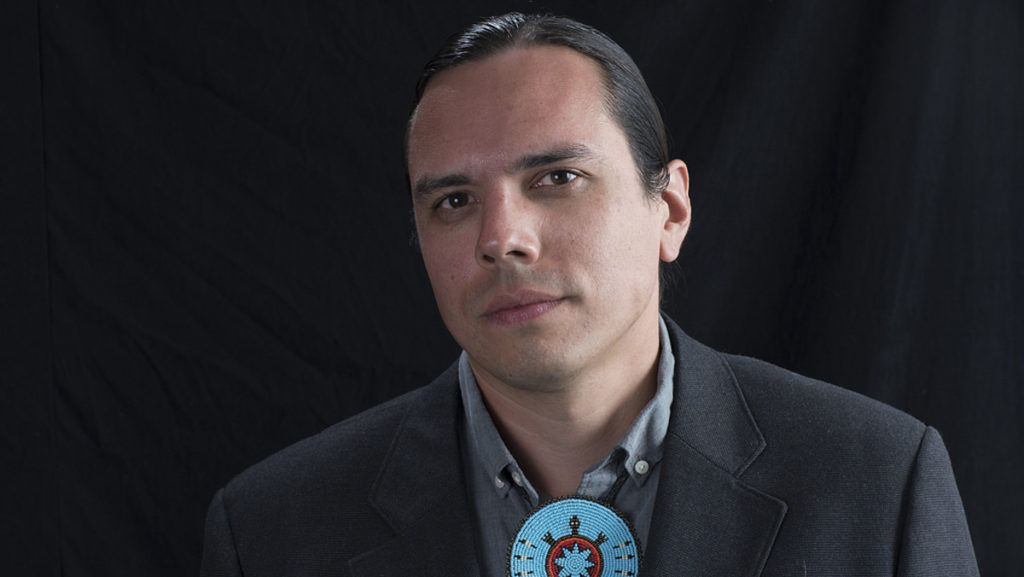Nick Estes first became involved in activism as a teenager. He attended a nonviolent anti-war rally in 2003, where he witnessed police officers using force to stop the protesters. This experience inspired him to dedicate his life to social justice causes, specifically for indigenous people.
Estes, who is a member of Kul Wicasa Oyate from the Lower Brule Sioux Tribe and co-founder of The Red Nation, works with the organization that supports and advocates for indigenous people. He is an assistant professor of American studies at the University of New Mexico and published a book earlier this year, called “Our History is the Future,” about the Standing Rock Sioux tribe’s resistance to the Dakota Access Pipeline in 2016. He is speaking at Ithaca College at 6 p.m. March 4 in Clark Lounge about indigenous resistance during the #NoDAPL movement and beyond.
Staff writer Noa Covell talked to Estes about his activism, work and identity.
This interview has been edited for length and clarity.
Noa Covell: How have you seen the work you’ve done affect the lives of the people involved in the Dakota Pipeline protest and at the Standing Rock Reservation?
Nick Estes: I don’t really have a measure of how my writing has affected people, but I would say what I try to do is I try to historically contextualize the movement of Native American rights itself and the longer historical struggle versus putting it as, just, like, … “a moment.” And in that sense, I think I’ve been able to affect people’s lives by providing the necessary context for people to understand themselves as historical actors and not just simply responding to an event in the moment. There was a lot of indigenous people involved in this, so I think we’re in a better situation than we were in the past because now we’re actually starting to pay attention to these issues.
NC: What was the turning point experience for you that made you realize that working in social justice was your passion?
NE: I was politicized in 2003 during the time of the invasion of Iraq, and so that, to me, really sent me on a path to do meaningful work. I grew up in South Dakota in a white–dominated border town, and I had attended a peaceful, nonviolent anti-war rally in Omaha, Nebraska, which was broken up by police. I was in high school at the time, and I saw people got tear–gassed, Maced and get beaten unconscious fighting for something they believed in. You don’t really come back from that experience not questioning the power of the status quo. When I saw this reaction from the crowd, it really stayed with me, and there was really no way for me to turn back. It had an impact on me to push me to think about my writing and my work and how it affects the things that we do.
NC: The title of your book is ‘Our History is the Future.’ How can we learn from explanations in your book to better the future for everyone living here?
NE: I think, by looking at Alexandria Ocasio-Cortez’s start to her campaign at Standing Rock as the water protector, this set her as the primary architect for pushing climate justice at the congressional level. She’s a democratic socialist, and the conversations that were able to happen there because of her involvement were able to lead to the first resistance to trump the [President Donald] Trump administration. In addition to her presence in Congress, we also have the first two Native American congresswomen, who have been part of the Standing Rock movement, which was one element that started a conversation about what was going on there. So, yeah, it’s incredibly important to look at these historical events because they bring importance to the future.
NC: What else are you going to do in order to continue the fight for indigenous people’s rights, besides the three books you’re coming out with?
NE: As an indigenous person who is from that area, we’re critical by default. We don’t have to do anything to make that change because our land will always be under threat, so it’s not necessarily a choice, and you can’t be neutral on a moving train, as they say. I mean, it doesn’t matter if I go to conventions or protests or heighten my activity — there will still be threats to our land from the Trump administration, which is trespassing through our territory. It doesn’t matter if I am critically engaged or not — our land will always be in threat as long as these systems remain. It’s not really a question of if “I will increase my activity” because the threat will always be there.
NC: For your upcoming talk at Ithaca College, what topics in your opinion are the most important to cover for college students to know?
NE: I think that it is important to be reminded that this is their fight, too, and it’s not just an Indian problem, but that it’s everyone’s problem.














